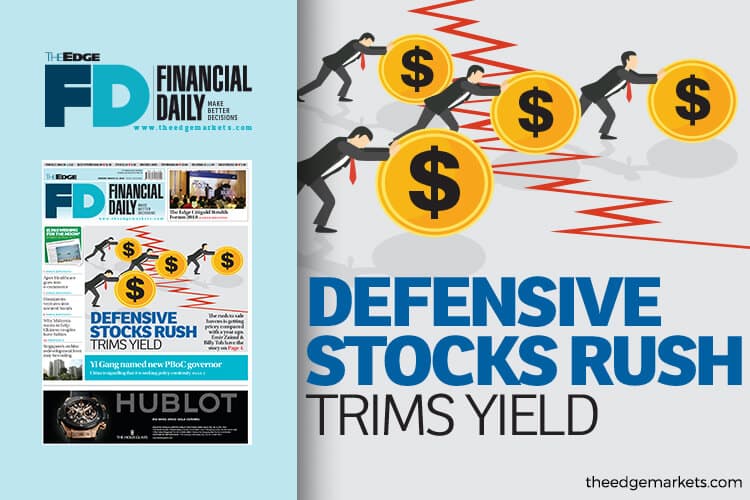
This article first appeared in The Edge Financial Daily on March 19, 2018
KUALA LUMPUR: The country's economic growth will moderate this year but it is expected to remain at a considerably strong pace at above 5%. The uncertainties on the home and external front have, however, overshadowed the healthy economic growth prompting investors to seek shelter in the super big-cap stocks (with market capitalisation [cap] of RM10 billion and above) that are perceived to be safe havens, and to retreat from the mid- and small-cap counters amidst liquidity concerns, in addition to earnings disappointments.
“Most investors fear of missing out on the rally in the stock market in anticipation of a synchronised global growth but were also cautious about some of the uncertain news and “noises” that are coming onto the market,” said a fund manager.
The same behaviour is seen in most asset classes including the fixed-income securities as well as the latest hype in the cryptocurrencies as well, according to him.
The rush to safe havens, mainly defensive counters that offer regular dividend payments, are getting pricey compared with a year ago as share prices continue to climb. The recent super big-cap stock rally on the local market has some of their yields falling below 3%, for instance Nestle (M) Bhd is at 2.1%, Public Bank Bhd (2.65%), Dutch Lady Milk Industries Bhd (1.48%) and Fraser & Neave (M) Bhd (1.81%). [see table 1]
In fact, profit-taking emerged last week among some consumer stocks, like Nestle, F&N and Dutch Lady. Most notably, Nestle was reaching new all-time highs every week since January; its share price surged 55.7% until last Tuesday, only to shed 16.77% in the following three days. Carlsberg Brewery Malaysia Bhd climbed nearly 37% to its five-year high of RM20.78 last Tuesday, but slid 8.4% to end last week at RM19.04.
A random check on Bloomberg data shows the current safe-haven rush is rather selected. Some of the stocks that are traditionally the defensive counters are still trading at high dividend yields.
Interestingly, the defensive darling British American Tobacco (M) Bhd stands out in terms of dividend yield. The tobacco stock is trading at a dividend yield of 6.1%, no thanks to the decline in the share price in the past three years.
Besides, the real estate investment trust (REIT) is much higher than the fixed deposit rates rising to above 6% too. YTL Hospitality REIT's yield is at 7.24%, MRCB Quill REIT (7.7%), IGB REIT 6.53% and Pavilion REIT (6.11%).
Why the defensive rush?
Inter-Pacific Securities Sdn Bhd head of research Pong Teng Siew pointed out that due to a lack of choice for defensive stocks, investors have been flocking to only these handful of big-cap stocks, pushing some stocks to be overvalued.
“I partially blame this [cautious sentiment] on the overly enthusiastic forecast for the stock market in 2018. Many analysts anticipated a bull market throughout the year. That was why we saw some excitement in January. But investors were caught by surprise in February when the US market plunged, and that has left a nervous market sentiment until now,” Pong said when asked about the reason for the surge in interest in large-cap stocks.
“At this point, it is an issue of valuation. Investors retrieved certain defensive stocks whose prices have stretched beyond what is justifiable. This is not sustainable,” commented Pong. The lower dividend yield will soon result in waning interest as they become unattractive, he added.
MIDF head of research Mohd Redza Abdul Rahman, however, reckons that the soaring share price of these defensive stocks may not deter buying interest as investors who buy into dividend yield stocks usually have a long-term investment horizon.
Mohd Redza noted that the low liquidity of these companies is a sign that these stocks are not fuelled by short-term trading interest.
“Nestle and Dutch Lady, for example, have an average 2018 monthly velocity of 14% and 19% respectively. Among the big-cap stocks, only F&N, KLK (Kuala Lumpur Kepang Bhd), Petronas Dagangan (Petronas Dagangan Bhd) and Public Bank have higher average velocity at 28%, 28%, 26% and 33% respectively,” he said.
In contrast, Areca Capital Sdn Bhd chief executive officer Danny Wong Teck Meng does not quite agree that defensive stocks should be the investment choice now simply because he believes that most uncertainties were triggered by external factors that are relatively insignificant to Malaysia’s corporate performance.
“Although there were some disappointments following the results season for the fourth quarter of 2017, I believe that most companies are still fundamentally strong,” Wong said, pointing out that the steel tariff imposed by the US President Donald Trump is expected to have minimal impact on the local steel industry.
Furthermore, Wong stressed that there is no indication a market crash is on the horizon, so the fears are quite misplaced. He did not agree with defensive strategy, instead he opines that investors should focus on the fundamentals of each individual company, rather than a blanket strategy of rushing to the defensive consumer counters although some of their valuations are already stretched.
He noted that the external risks have provided a cue for investors to take profits.